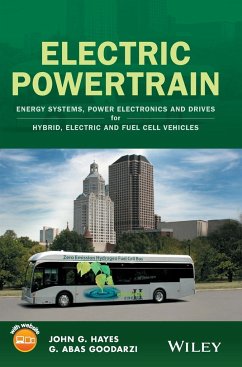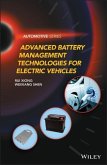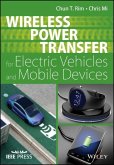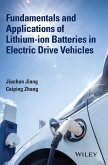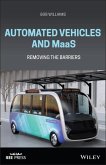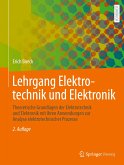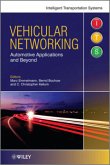The why, what and how of the electric vehicle powertrain
Empowers engineering professionals and students with the knowledge and skills required to engineer electric vehicle powertrain architectures, energy storage systems, power electronics converters and electric drives.
The modern electric powertrain is relatively new for the automotive industry, and engineers are challenged with designing affordable, efficient and high-performance electric powertrains as the industry undergoes a technological evolution. Co-authored by two electric vehicle (EV) engineers with decades of experience designing and putting into production all of the powertrain technologies presented, this book provides readers with the hands-on knowledge, skills and expertise they need to rise to that challenge.
This four-part practical guide provides a comprehensive review of battery, hybrid and fuel cell EV systems and the associated energy sources, power electronics, machines, and drives.The first part of the book begins with a historical overview of electromobility and the related environmental impacts motivating the development of the electric powertrain. Vehicular requirements for electromechanical propulsion are then presented. Battery electric vehicles (BEV), fuel cell electric vehicles (FCEV), and conventional and hybrid electric vehicles (HEV) are then described, contrasted and compared for vehicle propulsion. The second part of the book features in-depth analysis of the electric powertrain traction machines, with a particular focus on the induction machine and the surface- and interior-permanent magnet ac machines. The brushed dc machine is also considered due to its ease of operation and understanding, and its historical place, especially as the traction machine on NASA's Mars rovers. The third part of the book features the theory and applications for the propulsion, charging, accessory, and auxiliary power electronics converters. Chapters are presented on isolated and non-isolated dc-dc converters, traction inverters, and battery charging. The fourth part presents the introductory and applied electromagnetism required as a foundation throughout the book.
_ Introduces and holistically integrates the key EV powertrain technologies.
_ Provides a comprehensive overview of existing and emerging automotive solutions.
_ Provides experience-based expertise for vehicular and powertrain system and sub-system level study, design, and optimization.
_ Presents many examples of powertrain technologies from leading manufacturers.
_ Discusses the dc traction machines of the Mars rovers, the ultimate EVs from NASA.
_ Investigates the environmental motivating factors and impacts of electromobility.
_ Presents a structured university teaching stream from introductory undergraduate to postgraduate.
_ Includes real-world problems and assignments of use to design engineers, researchers, and students alike.
_ Features acompanion website with numerous references, problems, solutions, and practical assignments.
_ Includes introductory material throughout the book for the general scientific reader.
_ Contains essential reading for government regulators and policy makers.
Electric Powertrain: Energy Systems, Power Electronics and Drives for Hybrid, Electric and Fuel Cell Vehicles is an important professional resource for practitioners and researchers in the battery, hybrid, and fuel cell EV transportation industry. The book is a structured holistic textbook for the teaching of the fundamental theories and applications of energy sources, power electronics, and electric machines and drives to engineering undergraduate and postgraduate students.
Textbook Structure and Suggested Teaching Curriculum
This is primarily an engineering textbook covering the automotive powertrain, energy storage and energy conversion, power electronics, and electrical machines. A significant
Hinweis: Dieser Artikel kann nur an eine deutsche Lieferadresse ausgeliefert werden.
Empowers engineering professionals and students with the knowledge and skills required to engineer electric vehicle powertrain architectures, energy storage systems, power electronics converters and electric drives.
The modern electric powertrain is relatively new for the automotive industry, and engineers are challenged with designing affordable, efficient and high-performance electric powertrains as the industry undergoes a technological evolution. Co-authored by two electric vehicle (EV) engineers with decades of experience designing and putting into production all of the powertrain technologies presented, this book provides readers with the hands-on knowledge, skills and expertise they need to rise to that challenge.
This four-part practical guide provides a comprehensive review of battery, hybrid and fuel cell EV systems and the associated energy sources, power electronics, machines, and drives.The first part of the book begins with a historical overview of electromobility and the related environmental impacts motivating the development of the electric powertrain. Vehicular requirements for electromechanical propulsion are then presented. Battery electric vehicles (BEV), fuel cell electric vehicles (FCEV), and conventional and hybrid electric vehicles (HEV) are then described, contrasted and compared for vehicle propulsion. The second part of the book features in-depth analysis of the electric powertrain traction machines, with a particular focus on the induction machine and the surface- and interior-permanent magnet ac machines. The brushed dc machine is also considered due to its ease of operation and understanding, and its historical place, especially as the traction machine on NASA's Mars rovers. The third part of the book features the theory and applications for the propulsion, charging, accessory, and auxiliary power electronics converters. Chapters are presented on isolated and non-isolated dc-dc converters, traction inverters, and battery charging. The fourth part presents the introductory and applied electromagnetism required as a foundation throughout the book.
_ Introduces and holistically integrates the key EV powertrain technologies.
_ Provides a comprehensive overview of existing and emerging automotive solutions.
_ Provides experience-based expertise for vehicular and powertrain system and sub-system level study, design, and optimization.
_ Presents many examples of powertrain technologies from leading manufacturers.
_ Discusses the dc traction machines of the Mars rovers, the ultimate EVs from NASA.
_ Investigates the environmental motivating factors and impacts of electromobility.
_ Presents a structured university teaching stream from introductory undergraduate to postgraduate.
_ Includes real-world problems and assignments of use to design engineers, researchers, and students alike.
_ Features acompanion website with numerous references, problems, solutions, and practical assignments.
_ Includes introductory material throughout the book for the general scientific reader.
_ Contains essential reading for government regulators and policy makers.
Electric Powertrain: Energy Systems, Power Electronics and Drives for Hybrid, Electric and Fuel Cell Vehicles is an important professional resource for practitioners and researchers in the battery, hybrid, and fuel cell EV transportation industry. The book is a structured holistic textbook for the teaching of the fundamental theories and applications of energy sources, power electronics, and electric machines and drives to engineering undergraduate and postgraduate students.
Textbook Structure and Suggested Teaching Curriculum
This is primarily an engineering textbook covering the automotive powertrain, energy storage and energy conversion, power electronics, and electrical machines. A significant
Hinweis: Dieser Artikel kann nur an eine deutsche Lieferadresse ausgeliefert werden.
Hayes and Goodarzi have focused their considerable talent and experience to teaching the inner workings of the electric car. Readers, whether engineers, students, or the interested public will find this book a treasure trove of knowledge on modern automotive technology. In conclusion, what a great book! --John M Miller, J-N-J Miller Design Services PLLC, Longview, Texas, USA
I highly recommend 'Electric Powertrain: Energy Systems, Power Electronics and Drives for Hybrid, Electric and Fuel Cell Vehicles' by Dr John G. Hayes and Dr G. Abas Goodarzi. I use this book as my core teaching text on my module Transportation Power and Systems 3, which I teach to third year BEng and MEng Mechanical Engineering undergraduates in Queen's University Belfast. This book captures the fundamentals and in-depth aspects of the key elements of the course I teach including drive cycles, power trains for hybrids, vehicle dynamics, batteries and machines. The worked examples are excellent. The text book is very well laid out with superb well thought-out practical problems at the end of each chapter. This book is very relevant to those who wish to expand their knowledge of hybrid vehicles. It seamlessly integrates the electrical, civil and mechanical disciplines in this growing and multidisciplinary area. This is especially important considering the sustainable direction of land-based transport will take over the next decade as we strive to combat global warming and reduce greenhouse gas emissions. --Dr Aoife Foley, School of Mechanical and Aerospace Engineering, Queen's University Belfast, United Kingdom
I highly recommend 'Electric Powertrain: Energy Systems, Power Electronics and Drives for Hybrid, Electric and Fuel Cell Vehicles' by Dr John G. Hayes and Dr G. Abas Goodarzi. I use this book as my core teaching text on my module Transportation Power and Systems 3, which I teach to third year BEng and MEng Mechanical Engineering undergraduates in Queen's University Belfast. This book captures the fundamentals and in-depth aspects of the key elements of the course I teach including drive cycles, power trains for hybrids, vehicle dynamics, batteries and machines. The worked examples are excellent. The text book is very well laid out with superb well thought-out practical problems at the end of each chapter. This book is very relevant to those who wish to expand their knowledge of hybrid vehicles. It seamlessly integrates the electrical, civil and mechanical disciplines in this growing and multidisciplinary area. This is especially important considering the sustainable direction of land-based transport will take over the next decade as we strive to combat global warming and reduce greenhouse gas emissions. --Dr Aoife Foley, School of Mechanical and Aerospace Engineering, Queen's University Belfast, United Kingdom

